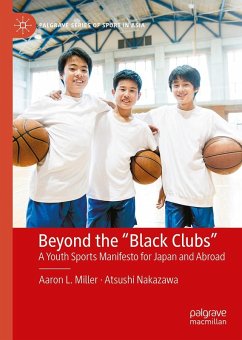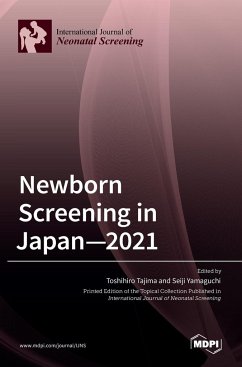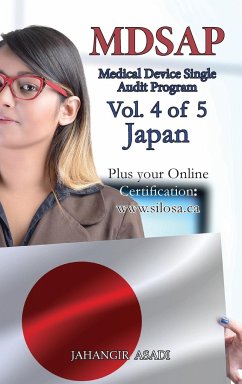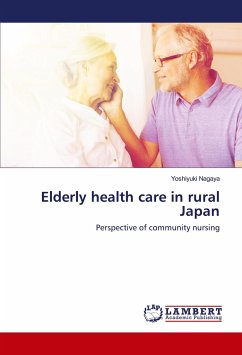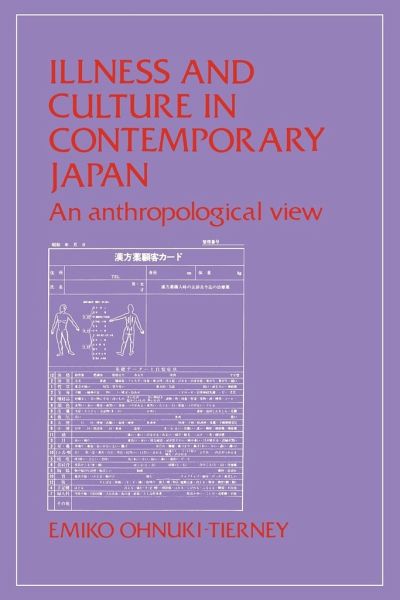
Illness and Culture in Contemporary Japan
An Anthropological View
Versandkostenfrei!
Versandfertig in 1-2 Wochen
31,99 €
inkl. MwSt.

PAYBACK Punkte
16 °P sammeln!
Health care in contemporary Japan - a modern industrial state with high technology, but a distinctly non-Western cultural tradition - operates on several different levels. In this book Emiko Ohnuki-Tierney provides a detailed and historically informed account of the cultural practices and cultural meaning of health care in urban Japan. In contrast to most ethnomedical studies, this book pays careful attention to everyday hygienic practices and beliefs, as well as presenting a comprehensive picture of formalized medicine, health care aspects of Japanese religions, and biomedicine. These differe...
Health care in contemporary Japan - a modern industrial state with high technology, but a distinctly non-Western cultural tradition - operates on several different levels. In this book Emiko Ohnuki-Tierney provides a detailed and historically informed account of the cultural practices and cultural meaning of health care in urban Japan. In contrast to most ethnomedical studies, this book pays careful attention to everyday hygienic practices and beliefs, as well as presenting a comprehensive picture of formalized medicine, health care aspects of Japanese religions, and biomedicine. These different systems compete with one another at some levels, but are complementary in providing health care to urban Japanese, who often use more than one system simultaneously. As an unequalled portrayal of health care in a modern industrial, but non-Western, setting, it will be of widespread interest to scholars and students of anthropology, medicine, and East Asian studies.
Table of contents:
List of illustrations; Acknowledgments; 1. Introduction; Part I. Basic Concepts and Attitudes Toward Health and Illness: 2. Japanese germs; 3. My very own illness: illness in a dualistic world view; 4. Physiomorphism (somatizion): an aspect of the Japanese illness etiology; Part II. Medical Pluralism: 5. Kanpo: traditional Japanese medicine of Chinese origin; 6. Medical roles of Japenese religions: a descriptive overview; 7. Medical roles of Japanese religions: a historical-symbolic interpretation; 8. Doctors and outpatients: biomedicine (I); 9. Hospitalization: biomedicine (II); 10. Medical pluralism; Summary; References; Index.
Ohnuki-Tierney provides a detailed and historically informed account of the cultural practices and cultural meaning of health care in urban Japan. This book pays careful attention to everyday hygienic practices and beliefs, as well as presenting a comprehensive picture of formalized medicine, health care aspects of Japanese religions, and biomedicine.
The cultural practices and cultural meaning of health care in urban Japan.
Table of contents:
List of illustrations; Acknowledgments; 1. Introduction; Part I. Basic Concepts and Attitudes Toward Health and Illness: 2. Japanese germs; 3. My very own illness: illness in a dualistic world view; 4. Physiomorphism (somatizion): an aspect of the Japanese illness etiology; Part II. Medical Pluralism: 5. Kanpo: traditional Japanese medicine of Chinese origin; 6. Medical roles of Japenese religions: a descriptive overview; 7. Medical roles of Japanese religions: a historical-symbolic interpretation; 8. Doctors and outpatients: biomedicine (I); 9. Hospitalization: biomedicine (II); 10. Medical pluralism; Summary; References; Index.
Ohnuki-Tierney provides a detailed and historically informed account of the cultural practices and cultural meaning of health care in urban Japan. This book pays careful attention to everyday hygienic practices and beliefs, as well as presenting a comprehensive picture of formalized medicine, health care aspects of Japanese religions, and biomedicine.
The cultural practices and cultural meaning of health care in urban Japan.






